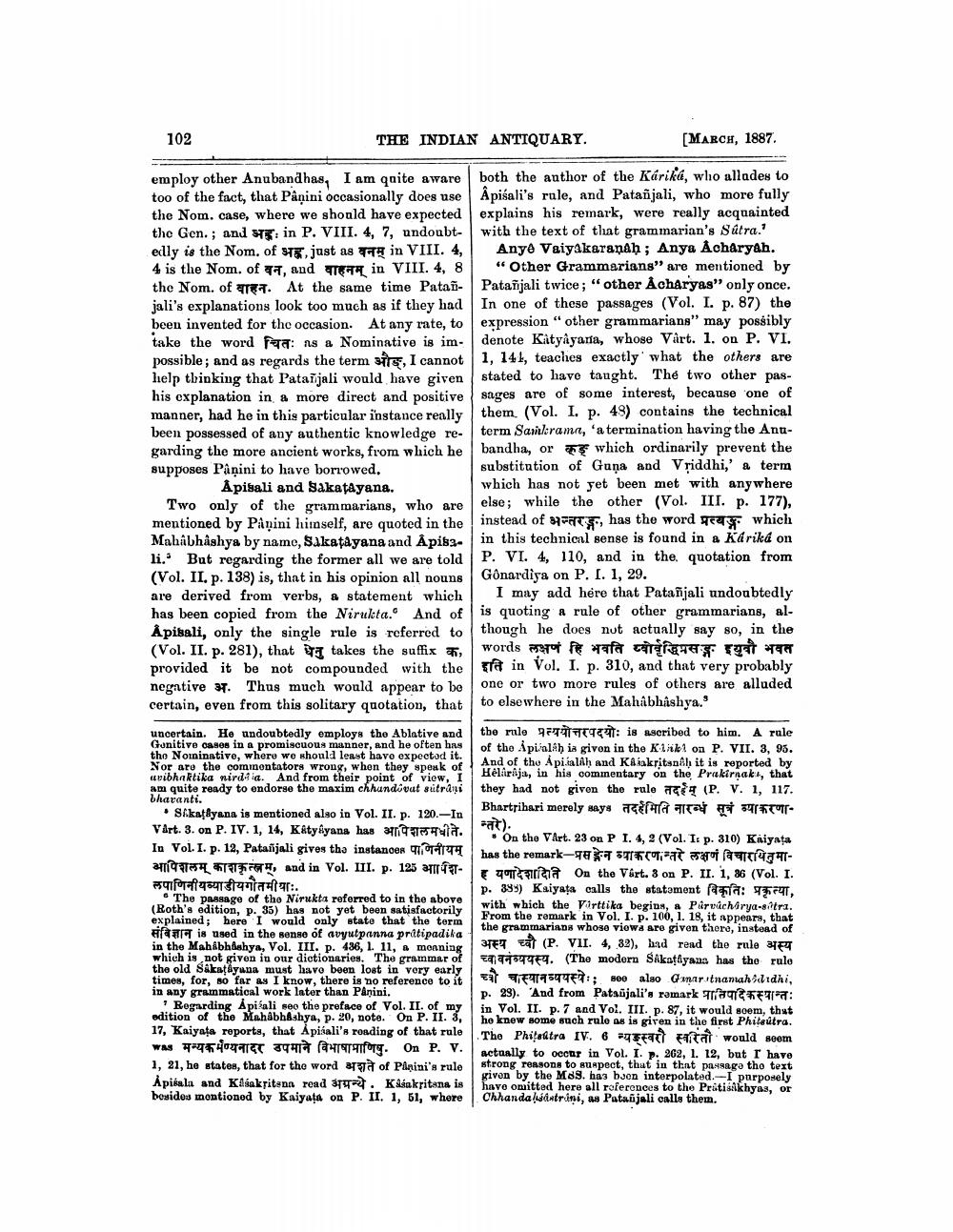________________
102
THE INDIAN ANTIQUARY.
[MARCH, 1887
employ other Anubandhas, I am quite aware both the anthor of the Karika, who allades to too of the fact, that Pånini occasionally does use Åpisali's rule, and Patañjali, who more fully the Nom. case, where we should have expected explains his remark, were really acquainted the Gen.; and 75: in P. VIII. 4, 7, undoubt with the text of that grammarian's Satra. eilly is the Nom. of just as T in VIII. 4, Anye Vaiyakaranah ; Anya Acharyah. 4 is the Nom. of 7, and in VIII. 4, 8 "Other Grammarians" are mentioned by the Nom. of 4. At the same time Pata - Patañjali twice; "other Acharyas" only once. jali's explanations look too much as if they had In one of these passages (Vol. I. p. 87) the been invented for the occasion. At any rate, to expression “other grammarians" may possibly take the word fra: ns a Nominative is im- denote Kityâyaria, whose Vårt. 1. on P. VI. possible; and as regards the term sirs, I cannot 1, 141, teaches exactly what the others are help thinking that Patanjali would have given stated to have taught. The two other pashis explanation in a more direct and positive sages are of some interest, because one of manner, had he in this particular instance really them. (Vol. I, p. 49) contains the technical been possessed of any authentic knowledge re
term Sawlrama, 'a termination having the Anugarding the more ancient works, from which he bandha, or which ordinarily prevent the supposes Panini to have borrowed.
substitution of Guņa and Vriddhi,' a term Apisali and Sakatayana.
which has not yet been met with anywhere Two only of the grammarians, who are
else; while the other (Vol. III. p. 177), mentioned by Panini hinself, are quoted in the instead of 81 , has the word gear which Mahabhishya by name, Sakatayana and Åpisa. in this technical sense is found in a Karika on li.. But regarding the former all we are told P. VI. 4, 110, and in the quotation from (Vol. II. p. 138) is, that in his opinion all nouns are derived from verbs, a statement which I may add here that Patanjali undoubtedly has been copied from the Nirulta. And of is quoting a rule of other grammarians, alÅpisali, only the single rule is referred to though he does not actually say so, in the (Vol. II. p. 281), that w takes the suffix , words लक्षणं हि भवति प्योर्वृद्धिप्रसङ्ग इयुवी भवत provided it be not compounded with the a in Vol. I. p. 310, and that very probably negative af. Thus much would appear to be one or two more rules of others are alluded certain, even from this solitary quotation, that to else where in the Mahabhashya."
uncertain. He undoubtedly employs the Ablative and the rule 9FT TTTTTT: is ascribed to him. A rule Genitive cases in a promiscuous manner, and he often has
of the Åpi/alah is givon in the Kliki on P. VII. 3, 95. tho Noininative, where we should least havo expected it. Nor are the commontators wrong, when they speak of
And of the Apialah and Kaiakritsnih it is reported by avibhaktika nirdim. And from their point of view, I
Héláraja, in his commentary on the Prakiraak, that am quite ready to endorse the maxim chhandivat strani they had not given the rule 4 (P. V. 1, 117. bharanti. • Sikatyana is mentioned also in Vol. II. p. 120.-In
Bhartrihari merely says nera arrar TorVart. 3. on P. IV. 1, 14, Katykyana has 37.99
at). a.
On the V Art. 23 on P I. 4,2 (Vol. I. p. 310) Kaiyata In Vol. I. p. 12, Pataljali gives the instances TT has the remark-
T T T
T TTT a , and in Vol. III. p. 125 a 19
G a On the Vért. 3 on P. II. 1, 86 (Vol. I. लपाणिनीयव्याडीयगौतमीयाः.
p. 393) Ksiyata calls the statament a: 7 , The passage of the Nirukta referred to in the above
with which the Virttika begins, a Pirricharya-stri. (Roth's edition, p. 35) has not yet been satisfactorily
From the remark in Vol. I. p. 100, 1. 18, it appears, that explained; here I would only state that the term
the grammarians whose views are given there, instead of T is used in the sense of avyutpanna pritipadika1 in the Mahabhahya, Vol. III. p. 436, 1. 11, meaning
37E7 at (P. VII. 4, 32), had read the rule 37 which is not given in our dictionaries. The grammar of 09757964. (The modern SAkatyaas has the rulo the old Saksyuna must havo been lost in very early times, for, so far as I know, there is no reference to it
* F959457; see also Gartnamahadhi, in any grammatical work later than Panini.
p. 29). "And from Patsūjali's romark Tita 7 7: Rogarding Apisali seo the preface of Vol. II. of my l in Vol. II. p. 7 and Vol. III. D. 87. it would an edition of the MahabhAshya, p. 20, note. On P. II. 3,
he knew some such rule as is given in the first Philadtra. 17, Kaiyata reports, that A pisali's roading of that rule The Phitaltra IV. 6 - FT Fical would seem was मन्यकर्मण्यनादर उपमाने विभाषामाणिषु. On P. V.
actually to occur in Vol. I. p. 262, 1. 12, but I have 1, 21, he staton, that for the word aga of Panini's rule strong reason to Ruspect, that in that partago tho text
givon by the M88. has buen interpolated.-I purposely A pisala and K akiten road a . Klakritsna is have omitted here all roferences to the Prátisakhyas, or bowidou montionod by Kaiyata on P. II, 1, 51, where Chhandalintrini, as Patanjali onlls them.
A




